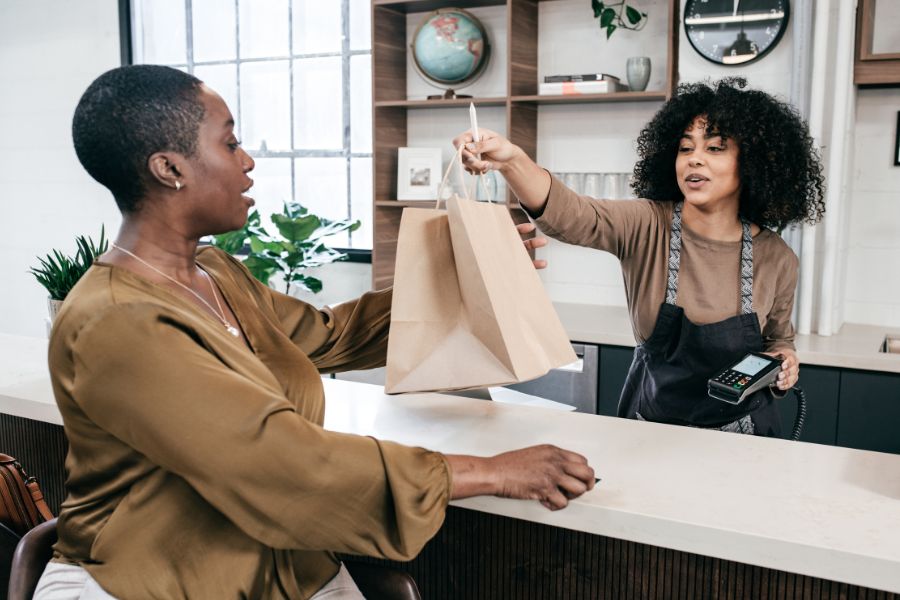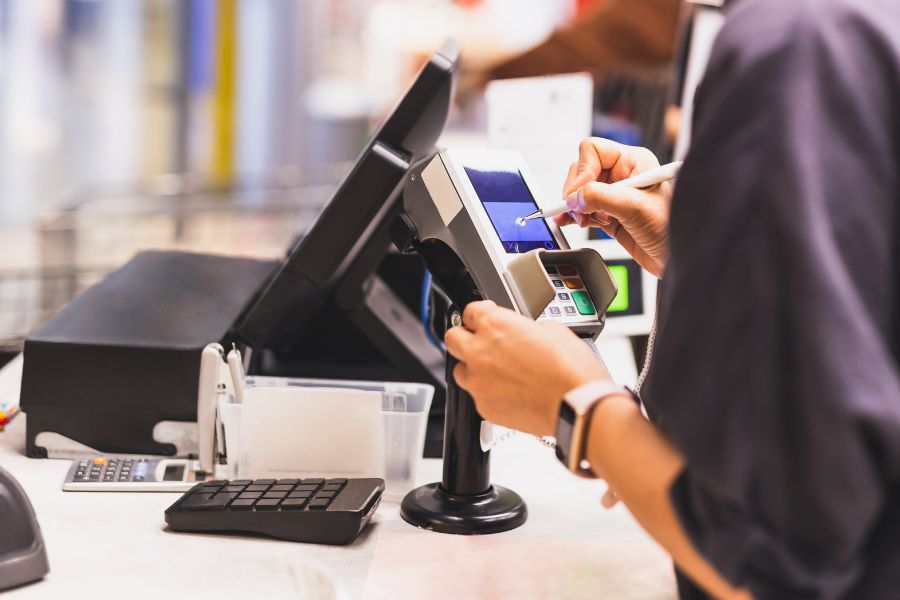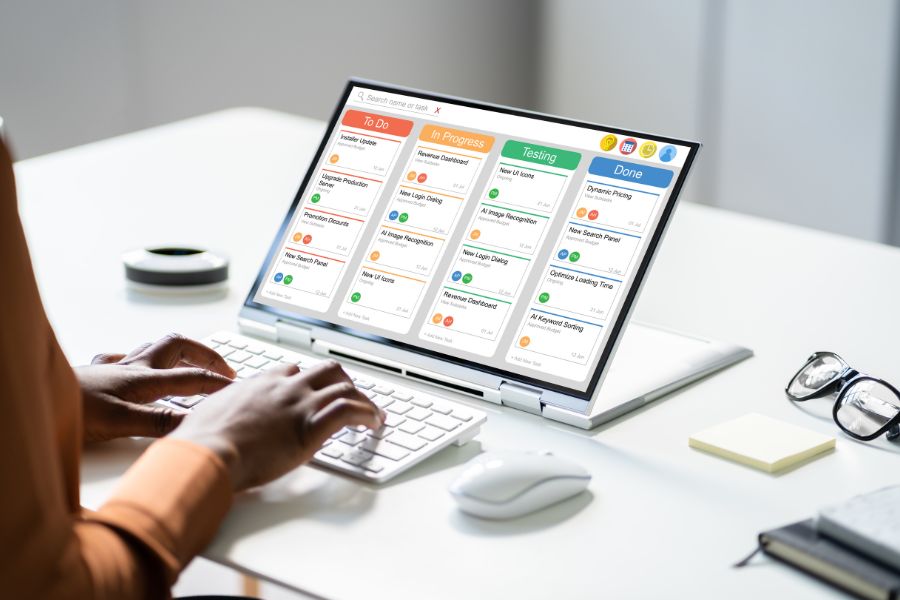Online retail has continued to grow in recent years as a result of incredible breakouts of modern technology. The evolutions of mobile devices, social networks, e-commerce platforms, etc. bring both advantages and challenges to retailers, who need to prepare carefully to adapt to changes and take the lead in the competition. When 2018 comes to end, let’s see which will change the game in the upcoming 2019 from the 22 predictions about the new online retail trends. All these 22 e-commerce predictions are divided into 3 sections, they are Technology will innovate the new retail trends, Online retail will be oriented by customer behavior, and Who will change in the developments.
Technology will innovate the new retail trends
AR and VR take advantages
AR is Augmented Reality and VR is Virtual Reality. AR and VR have already shown their potential in 2018 with many famous brands such as IKEA, Samsung, or Amazon. These technologies help customer to view and try products on their devices before making decisions to buy. AR and VR bring real customer experience, especially for online retailers who are selling home decor, furniture, clothes, cosmetics, etc. Many brands are investing to develop AR and VR, and now Amazon and Samsung are the two giants who are leading the development.
Voice technology drives more sales
Have you ever heard about the term “voice commerce”, it refers to the transactions that occur when customers purchase products by voice. Huge development of voice technology allows people to search, select and purchase by talking with their devices and it was used by 41% of customers of Amazon Echo and Google Home in 2017. And there will be 50% of total searchers will use voice search in 2020.
SaaS solutions lead the retail trends
SaaS stands for Software as a Service solution, they are becoming the best choice for online retailers because most e-commerce platforms are not very flexible, the operations are pretty slow and business owners would find it hard to scale up their sale volume. SaaS solutions run separately on the cloud and are independent from the on-premise system. Therefore, they are stable, flexible and scalable at a reasonable price. In order to use a SaaS solution, website owners have to agree to pay monthly or yearly subscriptions instead of on-time payment as on-premise solutions. However, SaaS is one of the most significant movements in modern online retail trends, retailers have to follow it or accept to be left behind.
Modern delivery in the retail ecosystem
Another e-commerce prediction for 2019 online retail trends is the transformation in delivery services. Amazon has started to use drones to ship products in England, or with traditional shipping methods, companies have some new options to operate the services such as subscription-based delivery. Customer experience in delivery services would be improved remarkably with 2-hour shipping or in-day shipping, and cross-channel purchases are also served. This trend will be encouraged more in 2019 with the support from modern technologies, which bring smooth operation and detailed management for high sales volume.
Easy mobile checkout
The principles of Mobile-First have been popular for many years, and there is a prediction for e-commerce in 2022, Smartphones will account for 175.4 US dollars in sales and they will keep leading the retail trends. Therefore, if retailers want to grow revenue, the most significant task is optimizing the mobile experience, especially the checkout process. The average cart abandonment rate for all devices in 2017 is around 79%, and 28% of cart abandonment is because of complicated checkout. In order to have a good experience on mobile, the checkout process needs to be done within one page, which requires an autofill function and doesn’t force the customer to register if it is not really necessary.
More interactive chatbots
In 2019, modern chatbots with AI integrations will help to improve the conversion rate significantly. They can talk to customers under different scenarios naturally by the pre-configurations to consult, qualify leads, and close deals, as well as to collect accurate insights for merchants to make the right decisions.
Challenges for Website Optimization
Speed improvement for e-commerce websites is always a big challenge for technical teams. The mission would be more difficult in 2019 with a lot of requirements for back-end features like fulfillment, delivery, and inventory management, or high-quality front-end content like AR & VR, video, chatbots, etc. Moreover, all of them need to work smoothly on mobile devices. Voice search is also changing the way SEO is executed. So who takes the lead in website optimization will take the lead in the online retail trends.
Online retail will be oriented by customer behavior
Customized experience
Wishlist and Collections are good examples of customized experiences. These kinds of data reflect the interests and behaviors of customers for merchants to provide the right activities. 45% of customers prefer to buy from stores that have recommendations, and 56% of them will return.
Multi-channel funnels
Omnichannel retail is the main concept for e-commerce trends in 2019, which requires multi-channel marketing and multi-channel interactions to sell products. Study shows that multi-channel communications have 166% higher engagement than single-channel campaigns. The most difficult task for merchants in Multi-channel funnels is content management, it is important to make sure the coherence of messages through different channels.
Social Shopping – better e-commerce experience
In the new e-commerce trends, social networks are not simply huge traffic sources anymore. Now brands can sell their product via Facebook, Snapchat, or Instagram easily with cool features for e-commerce on these platforms. Approach and close sales, when customers are relaxing on their personal networks, would be the most friendly way to sell products.
Customer service automation
42% of retail customers continue to buy more after receiving good customer service, and 52% of unsatisfied customers stop to return to the stores. Moreover, with more channels to sell products with complicated delivery systems, there will be huge pressure on customer services in 2019. That’s why technologies should be applied to replace manual customer support. The prediction for e-commerce in 2020 is there will be 85% of customer interactions conducted without humans.
Content marketing takes advantages
Content marketing has been overused in recent years, but it doesn’t mean content marketing has performed as the best way to reach customers. 82% of marketers believe that they understand customers and always tell the story that customers want to hear, whereas only 23% of consumers think they are okay with the content from brands. Retail trends in 2019 which are controlled by modern technologies for data and insight analytics will see higher levels of selling content.
Consumers care about reliability
Customers always find a retail brand that they can trust, not only by product quality but also by brand images. The following numbers would present some key facts for the next retail trends:
- 33% of consumers choose to buy from companies that do environmental and social good
- 75% of customers are willing to share their personal data with the brands they trust, and 82% of them will not buy from brands that cannot protect data safety
- 63% of global customers would buy from a company that they consider to be authentic
Key strategies for advertisement
There are two crucial strategies to do advertising, which are video advertising and influencers. Micro-influencers, who have big number of followers on social networks but not to be a celebrity, are the most effective channels. Over 70% of consumers can be influenced by who they admire.
Mobile App is a must-have
In the retail industry, mobile apps are more effective than email and messages in reminding, pushing promotion, or cross-sales, etc. It also helps to create personalization and provide great data for CRM and customer insights. Most of ecommerce brands now have mobile apps, and 2019 will be the time for the big competition in customer experience.
Who will change in the developments
Direct-to-Customer continues to grow
Companies that are in D2C, direct-to-customer, business model will grow rapidly in 2019 and they will be the most dynamic and agile entrepreneurs in the upcoming retail trends. The D2C model cut out some distribution steps in wholesale models, and products would be sold directly from manufacturers to customers. D2C ensures the tightly controlled brand experience from beginning to end, and saves money for customers thanks to the shortened supply chains.
Subscription model in E-commerce
Subscription-based service is also the new model in modern ecommerce trends. Actually, subscription is not a new concept in digital business, however, it is a new way of monetizing in the retail industry. Blue Apron is a typical example for this kind of retail, Let’s check how they are doing with subscription service.
Online retail is followed by B2B e-commerce
Revenue from B2B ecommerce reached 5 trillion USD in 2017 and it is expected to grow to 6.7 trillion USD in 2020. Go along with the incredible growth of B2C retail, B2B e-commerce also has the same movement to ensure the capabilities of serving huge sale volumes for brands. There are 2 key factors that lead to the increase in B2B revenue, which are the support from high-tech solutions and the principle: of never competing with customers from great B2B companies.
Dropshipping would be more risky
2018 observed a lot of changes from Facebook, Amazon, Shopify, and stricted regulations from Paypal, Stripes to limit and manage the dropshipping market better. Therefore, big merchants who run dropshipping for a long time and have good reputations will become stable and find it easy to keep moving in dropshipping. However, for new merchants who are starting to attend the market, there would be many more risks for them in comparison with the previous years. So it would be no surprise if the development of dropshipping goes down when most of the retail trends go up.
Physical stores have new roles
With expensive items, purchasing at brick-and-mortar stores brings more security to 82% of UK customers, and the numbers are similar at many other countries in Europe. In addition, with the rise of Omnichannel Retail, physical stores will take important roles in product showcase, shipping, promotions or customer services.
Omnichannel Ecommerce
Omnichannel commerce is rising because online retail cannot overwhelm in-store shopping. During the development of e-commerce, consumer behaviors are divided into 2 segments which are 51% of shoppers prefer online purchases and 49% of shoppers feel better in physical stores. So Omnichannel will continue to be more complete as the main retail trend in 2019.
Payments and Cashback
Now customers have plenty of payment methods to use and with the rise of cryptocurrency and many new payment gateways, the landscape of payment services would be much more diverse in 2019. In order to compete with others, payment services are starting to offer a cashback function, a tiny amount of money would be sent to buyers as a small saving, it could be good benefit to encourage consumers to buy more.
ConnectPOS is a all-in-one point of sale solution tailored to meet your eCommerce POS needs, streamline business operations, boost sales, and enhance customer experience in diverse industries. We offer custom POS with features, pricing, and plans to suit your unique business requirements.




